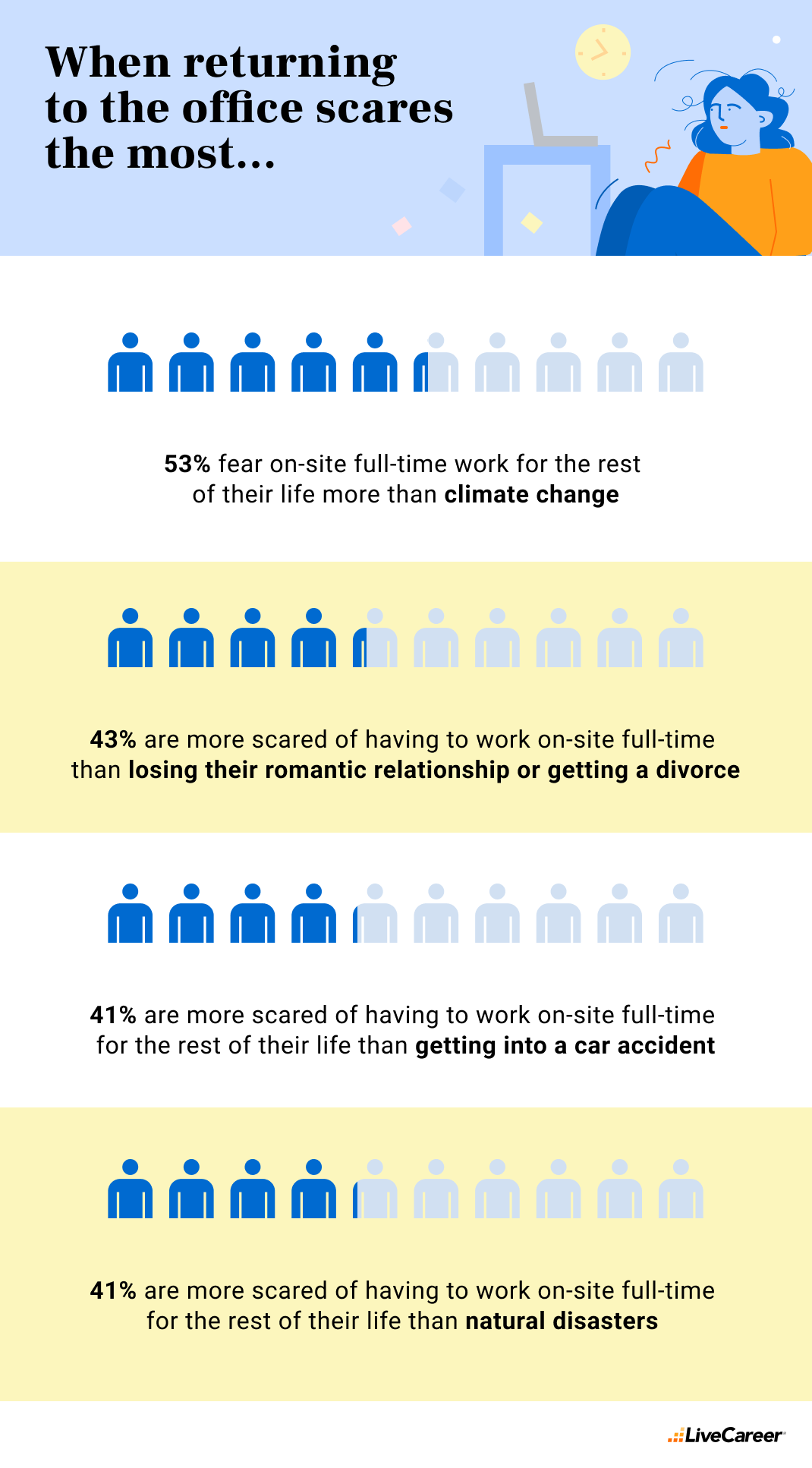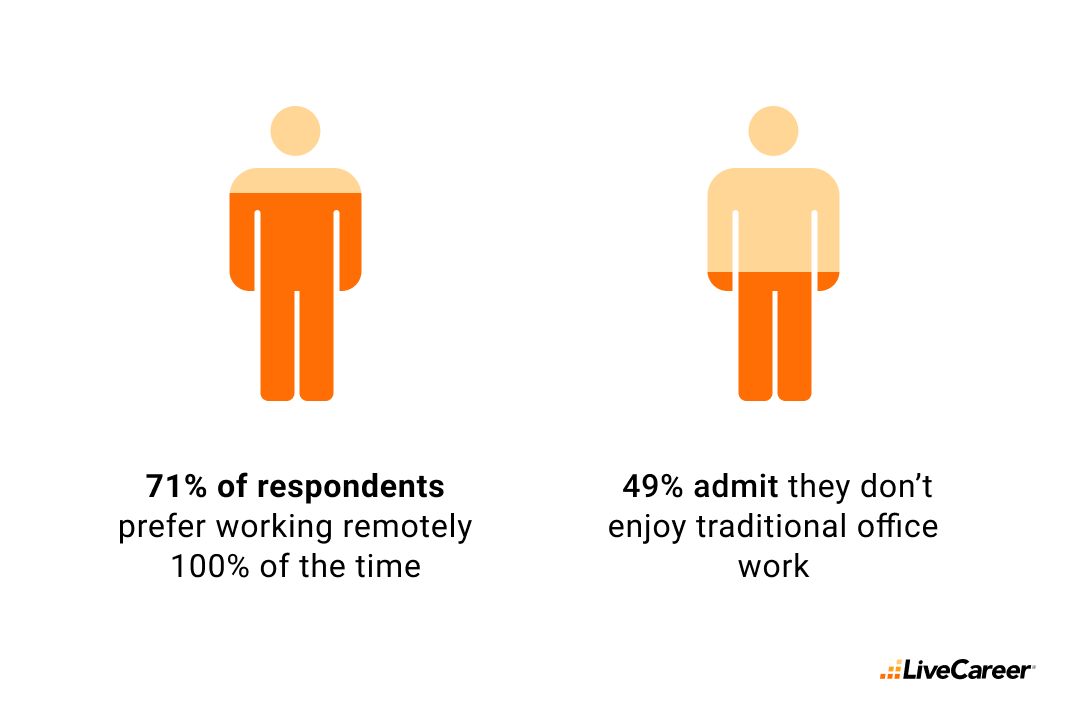Survey Finds 43% of Workers More Afraid of Returning to the Office Than Getting Divorced
Just a few years ago, a day that included pressing slacks and putting on dress shoes, fighting traffic, and being far from home for a significant amount of time was the status quo for most Americans. Today? It might as well be straight out of a horror film plot.
LiveCareer recently analyzed the value the workforce places on remote work, and the results show deep-seated fears of returning to the office. In fact, 43% of workers say they are more afraid of working in an office full-time than of losing their romantic relationship or getting a divorce. More than half (53%) fear the prospect of full-time office work more than climate change.
For the LiveCareer Fears & Remote Work report, 3,853 American respondents were surveyed between February 7 and 15, 2024, to gauge their feelings on returning to the office full-time, as well as how remote work impacts factors like mental health, job satisfaction, and productivity.
Continue reading to uncover further insights from Fears & Remote Work Report by LiveCareer, a service dedicated to resumes and cover letters
The Return to Office Is a Frightening Prospect
The survey gauged respondents’ fears regarding the prospect of returning to full-time on-site work. They were asked to rate their fear of working in a traditional office setting for the rest of their life compared to other possible catastrophes in life.
- 53% fear on-site full-time work for the rest of their life more than climate change.
- 43% are more scared of having to work on-site full-time than losing their romantic relationship or getting a divorce.
- 41% are more scared of having to work on-site full-time for the rest of their life than getting into a car accident.
- 41% are more scared of on-site full-time work than natural disasters (e.g., earthquakes, hurricanes).
The survey investigated and compared a number of additional scenarios and found returning to office work elicits a much greater fear among respondents than many other potential disasters:
- 34% fear on-site full-time work more than having $10,000 stolen.
- 24% are more scared of having to work on-site full-time for the rest of their life than developing a chronic illness.
- 23% are more scared of having to work on-site full-time than losing their retirement savings.
- 20% are more scared of working on-site full-time than running out of financial resources during retirement.
- 16% are more scared of having to work on-site full-time for the rest of their life than losing a loved one.
Workers Understand the Value of Remote Work
Having several years of experience in remote and hybrid work environments, the workforce has come to appreciate and understand the advantages and perks of flexible work setups. Even those who initially harbored doubts about the feasibility of remote work.
While nearly half (44%) of respondents said they were skeptical that remote work would be successful before they tried it, the majority now prefer a remote or hybrid work arrangement.
- The majority (71%) now prefer working remotely 100% of the time, with women (73%) preferring it more than men (63%).
- Another 22% of respondents prefer a hybrid model.
- Currently, 49% admit they don’t enjoy traditional office work.
Positive Outcomes of Remote Work
The study also found that remote work has a positive effect on many critical aspects like employee mental health, job satisfaction and productivity. For companies, remote work can serve as a straightforward path toward an engaged and motivated workforce.
Benefits of remote work include:
- 82% say working remotely is better for their mental health than working on-site.
- 79% say that working remotely is less stressful than working on-site.
- 62% say their overall job satisfaction is greatest when they work remotely 100% of the time.
- 60% feel most productive working remotely 100% of the time.
- 58% feel most motivated working remotely 100% of the time.
The Risk Employers Take With RTO Policies
Conversely, companies that require employees to return to the office full-time, may find only a small portion of workers thrive in a strictly on-site work environment. The study found that an extremely small portion of participants performed better on-site compared to remote and hybrid models.
- Only 2% of workers prefer fully on-site work over a remote or hybrid model.
- 3% say their overall job satisfaction is greatest when working on-site 100% of the time.
- Similarly, 3% feel most motivated working on-site 100% of the time.
- Only 3% feel most productive working on-site 100% of the time.
- 44% work longer hours while working remotely than from the office (including 48% of men working longer vs. 43% of women).
As employers decide whether to continue to permit remote and hybrid work options, it’s key to consider employees’ preferences and the work setup that best supports their well-being and performance. If not, employee retention and recruiting efforts could become a scary subject.
Methodology
The findings presented were obtained by surveying 3,853 American respondents on February 7-15, 2024. They were asked questions about their work preferences. These included yes/no questions, open-ended questions, scale-based questions relating to levels of agreement with a statement, and questions that permitted the selection of multiple options from a list of answers.
About LiveCareer
LiveCareer’s online Resume Builder is designed to empower its users to get better jobs and improve their job search. A one-stop shop among AI resume builder tools, LiveCareer features cutting-edge resume templates, a powerful cover letter builder, and extensive free career resources to support job candidates in reaching their professional goals. Trusted by over 10 million users around the world, LiveCareer has been publishing expert advice from Certified Professional Resume Writers since 2005. LiveCareer’s career tips have been featured in renowned media outlets, including Bloomberg, Forbes, and Newsweek. Stay connected with LiveCareer’s latest updates to improve your job search on Facebook, Instagram, LinkedIn, and X.








